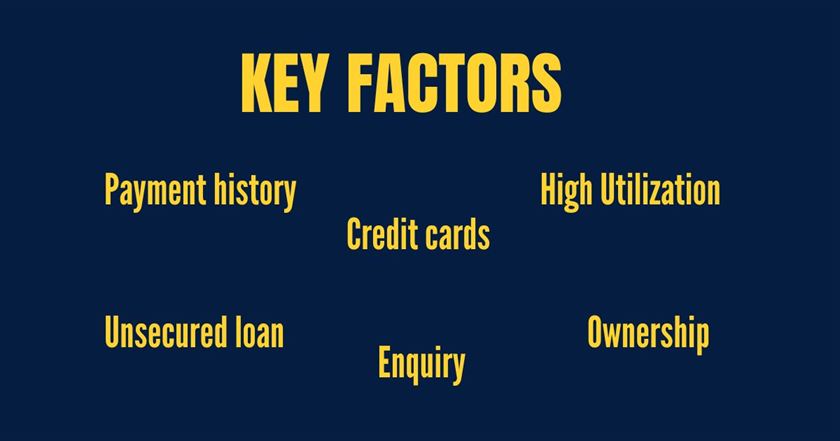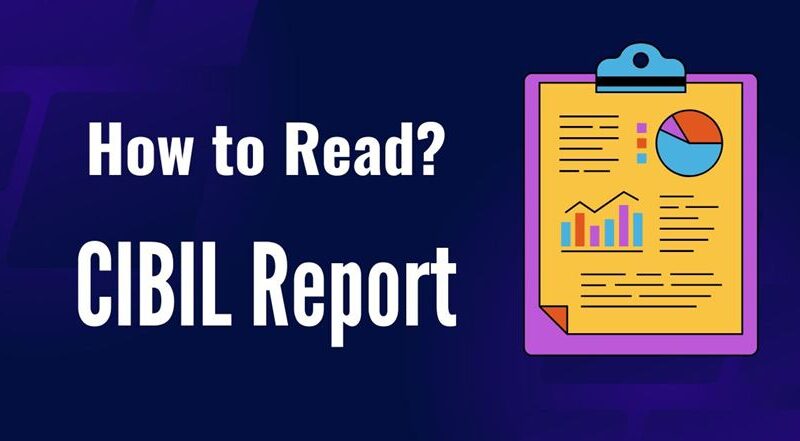How to read CIBIL report? Understand CIBIL Report in Detail.
Table of Contents
What is a CIBIL report and why is it important for your financial health?
First of all, before understanding “How to read CIBIL report?” you have to understand What is CIBIL? You must have gone for a loan at some point in your life and at that time you must have heard of or discussed CIBIL. Generally, everyone knows that every bank gives loans by looking at CIBIL score but friends actually the original word for this CIBIL score is the CREDIT SCORE and CIBIL is a company that determines credit scores by looking at your loan history. There is a total of four credit score agencies in India like CIBIL which is called Credit Information Companies. Every company’s method of Interpreting CIBIL report is the same with a few differences. Only CIBIL is the most widely used credit scoring agency in India so almost everyone knows this company as a CIBIL score provider.
CIBIL (Credit Information Bureau (India) Limited) is India’s first credit information company, which collects and maintains credit records of individuals and businesses. It is one of the four credit information companies authorized by the Reserve Bank of India (RBI) to maintain the credit information of individuals, including credit cards, loans, and other credit facilities availed from various lenders.
Credit Information Companies
These Credit information companies were established with the primary objective of exchanging information between banks and financial institutions to curb mounting delinquencies. Credit Information Companies are independent agencies that collect financial data of individuals and companies related to their credit facilities and other related information from various financial institutions. The Bank shall obtain reports from Credit Information Companies on the credit facilities enjoyed by the constituents as well as on the status of the accounts.
Currently, there are four authorized Credit Information Companies in India as follows:
- TransUnion CIBIL Limited (formally known as Credit Information Bureau (India) Limited)
- Equifax Credit Information Services Private Limited
- Experian Credit Information Company of India Private Limited
- CRIF High Mark Credit Information Services Private Limited
These Credit Information Companies in India are licensed by the Reserve Bank of India (RBI) and governed by the provisions under Credit Information Companies Regulation Act (CIC Act), 2005, and Credit Information Companies, Regulations and Rules Act, 2006. Every Credit Institution shall become a member of at least one Credit Information Company under section 15 of the Credit Information Companies (Regulation) Act, 2005 (CICRA). Although these 4 different companies but you can get answers for your question “How to read CIBIL report?” in this article.
What is CIBIL report?
It’s the first step of Understanding your credit report. CIBIL maintains credit records of over 600 million individuals and businesses in India and generates credit scores and reports based on their credit history. Lenders, such as banks, financial institutions, and credit card companies, use these credit scores and reports to evaluate the creditworthiness of an individual or business while considering their loan or credit applications.
How to access your CIBIL report and understand the information provided?
To access your CIBIL report, follow these steps:
- Visit the official website of CIBIL (https://www.cibil.com/freecibilscore)
- Click on the ‘Get Your Credit Score’ button
- Fill out the necessary details like name, address, PAN card number, email ID, and phone number.
- Click on the ‘Submit’ button.
Once you have submitted the form, you will receive an authentication code on your registered mobile number or email ID. Enter the code and you will be directed to the CIBIL report page. You can download your report and review the information provided.
To understand the information provided in your CIBIL report, you need to look at the following components:
- Personal Information: This section will have your name, address, date of birth, and other details.
- Contact Information: This section will have your phone number, email address, and other contact details.
- Employment Information: This section will have details of your current and past employment.
- Account Information: This section will have information on all your credit accounts like credit cards, loans, and mortgages.
- Enquiry Information: This section will have details of all the enquiries made on your credit report.
You can also check your CIBIL score, which is a three-digit number ranging from 300 to 900. This score is based on your credit history and helps lenders determine your creditworthiness. The higher the score, the better your chances of getting a loan or credit card with favorable terms and conditions.
If you find any errors or discrepancies in your CIBIL report, you can raise a dispute with CIBIL to get it corrected.
Types of scoring and how it helps in Reading your credit score report
A higher CIBIL score, which ranges from 300 to 900, indicates a better credit history and increases the likelihood of getting approved for credit at favorable terms, such as lower interest rates and higher loan amounts. Hence, maintaining a good credit score is essential for individuals and businesses to access credit at competitive rates and useful for banks Analyzing your credit history report.
CIBIL reports provide two scores:
- Credit Vision Score: It reflects credit health of the person in respect of all loans viz. both secured as well as unsecured loan and also credit history of last 36 months.
- Personal score: It considers repayment pattern of a person in respect of only personal loans viz. unsecured loans (credit Card/Union Personal loan, etc.)
What are the different sections of a CIBIL report and what do they mean?
A CIBIL report is a credit information report that provides information about an individual’s credit history and credit score. The report is divided into several sections, each of which provides different information about the individual’s creditworthiness. The different sections of a CIBIL report are:
- Personal Information: This section contains personal information about the individual such as name, date of birth, gender, address, and identification details like PAN and Aadhaar card.
- Contact Information: This section provides contact details of the individual, including their email address and phone number.
- Employment Information: This section contains information about the individual’s current and past employment details.
- Account Information: This section lists all the credit accounts that the individual has, including credit cards, loans, and other credit facilities. This section provides details such as the type of account, the date of account opening, the credit limit, the current balance, and the repayment history.
- Enquiry Information: This section lists all the inquiries made on the individual’s credit report by lenders or other financial institutions.
- Remarks: This section contains any remarks made by the credit bureau or the credit institution about the individual’s credit history.
- CIBIL Score: This is a three-digit number that reflects the individual’s creditworthiness. The CIBIL score ranges from 300 to 900, with a score above 750 considered good.
Understanding the information provided in each of these sections is important as it can help individuals identify any errors in their credit report or take steps to improve their credit score.
How to interpret your credit score and credit rating in the CIBIL report?
| Score | Decoding CIBIL report |
| -1 | This means that the borrower has no previous history of borrowing from any bank or other financial institution in the country for the last 36 months.The individual has no credit history i.e. is not reported to CIBIL by any lending institutions.The person has no credit history but is only inquired by the lending institution because the person may have applied for a loan but not taken or received the loan.The individual has a credit history, but none reported in the 36 months prior to the inquiry. |
| 300-900 | The individual has a credit history of more than 6 months (in last 36 months). 300-600: A credit score in this slab is considered a credit risk by banks and other financial institutions. Generally, people in this slab are not given credit cards and loans. 601-750: This is an intermediate range of scores and allows individuals to get loans from various banks. However, banks may refer to the overall financial position and consider other risk-related criteria to ensure creditworthiness e.g. Stable employment, different sources of income, loan security etc. 750+: A score above 750 is considered good and will help you get a loan or credit card easily. |
What are the Key Factors influencing the score:

1. Payment history – This is the most important factor for understanding “How to read CIBIL report?” If you make late payments or consistently default on EMIs or other dues, it indicates that you may be struggling to fulfill your existing credit obligations. This can have a negative impact on your credit score, making it more difficult to secure loans in the future. Therefore, it’s important to stay on top of your payments and manage your finances responsibly to maintain a good credit standing.
2. Number and types of credit accounts (more the unsecured loan, less the score): If one has recently been approved for multiple loans and credit cards, lenders will look at one’s application with caution as this behavior indicates an increased debt burden, which will negatively impact one’s score.
3. A higher percentage of credit cards or personal loans: Maintaining a well-balanced mix of secured loans, such as a home or auto loan, and unsecured loans, like credit cards or personal loans, can significantly improve your credit score. Lenders view a diversified credit portfolio favorably, as it demonstrates responsible borrowing and repayment behavior. By managing your credit mix wisely, you can boost your creditworthiness and increase your chances of getting approved for future loans.
4. High Utilization of facilities: If you’re wondering how your credit card usage affects your credit score, here’s what you need to know. While using your credit card more frequently won’t necessarily hurt your score, an increase in your current balance could signal financial strain and lead to a drop in your credit score. This is because a higher balance means a greater repayment burden, which may make lenders view you as a higher-risk borrower. To maintain a healthy credit score, it’s important to keep your credit card balances in check and pay them off in a timely manner.
5. Enquiry– Enquiries are added to your report when you apply for a loan or credit card and the then lender access this information to decide their credit decision.
6. Ownership: The field tells the lender who is responsible for payments on that loan or credit card. There are four type of indicates that can appear on cibil report:
- Single: Applicant is solely responsible for making payment on the account.
- Joint: Applicant and Co-Applicant joint responsibility for these accounts.
- Guarantor: A guarantor pledges to repay a loan on behalf of a third party who has taken a loan. Hence, he provides a guarantee to the lender that he will repay the loan, in case the principal applicant is unable to do so.
What is the meaning of Status remarks in CIBIL report:
| Possible status | Explanation |
| Restructured Loans | Bank has restructured the loan by offering different ways like Extending the loan tenure or reducing the interest rate) |
| Restructured loan (Govt. mandated) | The Bank has restructured the loan on the basis of government guidelines for natural calamities etc. |
| Written off (WO) | The lender has written off the amount due |
| Settled | The lender and the individual have settled the amount outstanding. |
| Post (WO) Settled amount due | Post the account being written off, the lender and the individual have settled the loan. |
| Account Sold | The lender has sold the particular account to another lender / financial institution. |
| Account Purchased | The particular loan account has been purchased from the original lender. |
| Account Purchased and Settled | The particular loan account has been purchased by the current lender and both the current lender and individual have reached a settlement with regard to the amount due. |
| Account Purchased and Written off | The particular loan account that has been purchased from another financial institution and has now been written off. |
| Account Purchased and Restructured | The particular loan account that has been purchased from another financial institution and has now been restructured with different terms and conditions. |
| Written off and Account sold | The lender has sold the written-off account to another lender /financial institution. |
“Status” area in CIBIL report should be always blank. Otherwise, it may contain phrases like, “settled” meaning settled under OTS, willful defaulter, suit filed, written off etc. Such accounts require additional due diligence.
Loan/Asset classification as per IRAC norms:
Very important information in CIBIL report is “Asset classification/Days past due” details, Normally asset classification details are shown in accounts where repayment of a loan is of EMI / particular periodicity in nature.
- STD – Standard accounts
- SMA – Special mention accounts (irregular)
- SS – Sub-standard
- DBT – Doubtful
- LSS – Loss assets
How to read Overdue concept in CIBIL report:
If your loan account is overdue for some days then it will show in your report. In such cases “Days past due” (DPD) concept is shown. Ex. If the EMI of your loan is due on 5th of every month, and if you paid it before 5th then “DPD will be shown is “000”. If EMI is paid on 15th then DPD will be “010”. DPD “XXX” means no information provided by your lender for that particular month.
Suit-filed/ Willful default:
In case of the bank has filed a suit against the applicant, there is a specific report prescribed by the Reserve Bank of India. This is as follows:
- No Suit Filed
- Suit filed
- Willful Default
- Suit filed (Willful Default)
What is meant by CIBIL score -1
In case of individuals with credit history of less than 6 months CIBIL score range of 1 to 5 and those with CIBIL score of -1, Bak may sanction the proposal. However, in such case bank will take extra care.
CIBIL MSME Rank (CMR)
For MSMEs with aggregate commercial borrowings above Rs.25 lakhs to Rs.10 crore bank generates CIBIL MSME Rank (CMR report).
Scoring model in CMR report is as follows:
- Borrowers with CMR rating up to CMR-3 should be given preference for faster disposal.
- For CMR 4/5, need-based facilities are to be approved as per extant guidelines.
- For CMR 6/7, these types of proposals are generally analyzed carefully and sanctioned at higher offices..
- This will also apply to existing borrowers requesting an enhancement of loans.
- Borrowers with CMR of 8/9/10 should not be considered in case of new account.
Does frequently checking CIBIL score will reduce my score?
There are two types of CIBIL inquiries Soft inquiries and Hard inquiries:
- Soft inquiries: If you check your CIBIL report directly from the website of above mentioned Credit Information Companies by yourself then these are soft inquiries and these will not affect your score.
- Hard inquiries: When you apply for a loan and the bank checks your CIBIL report then these will be Hard inquiries, frequent hard entries mean you are applying for a loan frequently and it gets rejected or you are in debt.
Tips for improving your credit score based on the information in your CIBIL report.
Improving your credit score is essential if you want to get approved for loans and credit cards at favorable terms. Here are some tips for improving your credit score based on the information in your CIBIL report:
- Pay your bills on time: Late payments or defaulting on loans and credit card payments can have a negative impact on your credit score. Make sure to pay your bills on time every month to maintain a good credit score.
- Maintain a low credit utilization ratio: Your credit utilization ratio is the percentage of your credit limit that you are using at any given time. It is recommended to maintain a credit utilization ratio of below 30% to improve your credit score.
- Check for errors in your credit report: Errors in your credit report such as incorrect personal information or accounts that do not belong to you can have a negative impact on your credit score. Review your credit report regularly and dispute any errors with the credit bureau.
- Limit your credit applications: Applying for too many loans or credit cards at once can make you appear credit hungry to lenders, which can negatively impact your credit score. Limit your credit applications and only apply for credit when you need it.
- Maintain a healthy credit mix: A healthy credit mix includes a mix of secured and unsecured loans, such as a home loan, car loan, and credit card. Maintaining a healthy credit mix can improve your credit score.
- Keep old credit accounts open: The length of your credit history is an important factor in calculating your credit score. Keeping your old credit accounts open and in good standing can help improve your credit score.
- Keep a check on the number of inquiries: Every time you apply for credit, a hard inquiry is made on your credit report. Too many inquiries within a short period can have a negative impact on your credit score. Try to limit the number of credit inquiries to maintain a healthy credit score.
In conclusion, maintaining a good credit score is important for your financial health. By following these tips and regularly monitoring your CIBIL report, you can improve your credit score and increase your chances of getting approved for loans and credit cards at favorable terms.
How to monitor changes in your CIBIL report over time and maintain a healthy credit profile?
Monitoring your CIBIL report regularly is important to ensure that your credit information is accurate and up-to-date. Here are some ways to monitor changes in your CIBIL report over time and maintain a healthy credit profile:
- Check your CIBIL report regularly: You are entitled to one free CIBIL report per year, so it’s a good idea to check your report at least once a year to ensure that your credit information is accurate. You can also purchase additional reports throughout the year for a fee.
- Set up credit monitoring alerts: Many credit bureaus and financial institutions offer credit monitoring services that can alert you to any changes in your credit report, such as new accounts or inquiries. Setting up these alerts can help you detect potential fraud and monitor changes in your credit report over time.
- Review your credit report carefully: When you receive your CIBIL report, review it carefully to ensure that all the information is accurate. Check for errors in personal information, account details, and payment history. If you find any errors, dispute them with the credit bureau immediately.
- Pay your bills on time: Late payments or defaulting on loans and credit card payments can have a negative impact on your credit score. Make sure to pay your bills on time every month to maintain a good credit score.
- Maintain a low credit utilization ratio: Your credit utilization ratio is the percentage of your credit limit that you are using at any given time. It is recommended to maintain a credit utilization ratio of below 30% to maintain a healthy credit profile.
- Keep old credit accounts open: The length of your credit history is an important factor in calculating your credit score. Keeping your old credit accounts open and in good standing can help maintain a healthy credit profile.
- Avoid credit card churning: Credit card churning refers to the practice of opening and closing credit card accounts frequently to take advantage of sign-up bonuses and rewards. This can have a negative impact on your credit score, so it’s important to avoid this practice.
In conclusion, monitoring changes in your CIBIL report over time is essential to maintain a healthy credit profile. By checking your report regularly, reviewing it carefully, paying your bills on time, and maintaining a low credit utilization ratio, you can ensure that your credit information is accurate and up-to-date.
What is CIBIL’s “Consumer Dispute Resolution”?
CIBIL’s Consumer Dispute Resolution (CDR) process is a mechanism that allows individuals to dispute any errors or discrepancies in their CIBIL credit report. If an individual notices any errors or inaccuracies in their credit report, they can raise a dispute with CIBIL to get them corrected.
The CDR process involves the following steps:
- Filing a dispute: The individual needs to raise a dispute by filling out the online dispute form available on the CIBIL website. The form requires the individual to provide details about the error, such as the account number and the nature of the error.
- Verification by CIBIL: Once the dispute is filed, CIBIL verifies the information with the concerned lender. The lender is required to provide CIBIL with the correct information within 30 days of receiving the dispute.
- Updating the credit report: If the information is found to be incorrect, CIBIL updates the credit report accordingly. If the information is found to be correct, CIBIL informs the individual of the same and provides them with a reason for not making any changes.
- Intimation to the individual: Once the dispute is resolved, CIBIL sends an intimation to the individual informing them about the outcome of the dispute.
The CDR process is an important mechanism for individuals to ensure that their credit report is accurate and up-to-date. By raising disputes and getting errors corrected, individuals can improve their credit score and increase their chances of getting approved for loans and credit cards at favorable terms.
Frequently Asked Questions
How to check your CIBIL score for Free?
Nothing is free, If you are generating CIBIL reports for free from third-party companies then your data may be shared or used to market financial products to you. You can get it from the official website of Credit Information Companies by paying some fees.
Is CIBIL report mandatory?
Yes, CIBIL report is mandatory for banks to take credit decisions with some exceptions, for example, the Minimum CIBIL score is not mandatory for Agricultural and MSME loans, but if there are any bad remarks in CIBIL report then the bank has the right to reject your application.
What happens if my CIBIL report has errors? and How can I clear my CIBIL dispute?
If your CIBIL report has errors, you should immediately notify CIBIL and request them to rectify the errors. You can do this by “Consumer Dispute Resolution” system along with supporting documents to CIBIL. CIBIL will investigate the errors and correct them if they are found to be genuine. Once the corrections are made, you should check your report again to ensure that the errors have been corrected. It is important to ensure that your credit report is accurate as it plays a critical role in determining your creditworthiness and ability to obtain loans and credit cards.
What is the purpose of CIBIL?
The purpose of CIBIL (Credit Information Bureau India Limited) is to collect and maintain credit information of individuals and companies to facilitate credit assessment and lending decisions by banks and financial institutions. CIBIL helps lenders evaluate borrowers’ creditworthiness and reduce the risk of defaults, thereby promoting responsible lending and borrowing.
Can I get loan without CIBIL score?
Yes, getting a loan without a CIBIL score is possible, especially if you are a first-time borrower. However, it may be difficult to get a loan from a bank or a traditional financial institution without a credit score, as they rely on it to assess your creditworthiness. Bank may consider your low CIBIL score but never ignore remarks in the Status field.
What does 000 mean in CIBIL report?
“000” means in Days Past Due, which means you paid your EMI of that month on time. If you paid you installment 5 days after the due date then DPD remark will be “005”.
What does a 0 /- 1 CIBIL score mean?
0/-1 CIBIL score means you have no credit history. It does not affect your loan approval process.
How much time will it take to resolve dispute in CIBIL?
CIBIL takes near about 30 days to resolve your dispute, it may take longer because it fully depends on member banks and financial institute replies.
Can CIBIL score be corrected?
If there are any wrong details then that can be corrected through “Consumer Dispute Resolution”
How can I remove wrong loan from CIBIL?
If there is a wrong loan entry in your CIBIL report, you can follow these steps to get it removed: 1. Check and your credit report and identify the incorrect loan entry. 2. Gather supporting documents to prove that the loan entry is incorrect. 3. Contact the lender that reported the loan to CIBIL and request them to rectify the mistake. 4. If the lender does not respond or denies the mistake, you can file a dispute with CIBIL online or through their customer care. 5. CIBIL will investigate the dispute and update your credit report accordingly.
Why does CIBIL show wrong information?
CIBIL may show wrong information due to errors in the data provided by lenders, inaccurate reporting by lenders, identity theft, or technical errors. It’s important to regularly check your credit report and dispute any incorrect information to ensure that your creditworthiness is not affected.
How can I correct my details in CIBIL report?
To correct your details in CIBIL report, you need to follow these steps: a. Obtain a copy of your CIBIL report and identify the incorrect details. b. Gather supporting documents to prove that the details are incorrect. Contact CIBIL and raise a dispute online or through their customer care. c. Submit the supporting documents and provide a clear explanation of the incorrect details. d.CIBIL will investigate the dispute and update your credit report accordingly. You will receive a confirmation once the correction is made.
Loan closed but not updated in CIBIL.
CIBIL updates its database frequently, it will get updated after 15-20 days after the closure of the loan account.
How do I remove an unknown loan from my credit report?
If there is an unknown loan entry in your credit report, you can follow these steps to get it removed: 1. Check your credit report and identify the unknown loan entry. 2. Gather supporting documents to prove that you did not apply for or take out the loan. 3. Contact the lender that reported the loan to the credit bureau and request them to rectify the mistake. 4. If the lender does not respond or denies the mistake, you can file a dispute with the credit bureau online or through their customer care. 5. The credit bureau will investigate the dispute and update your credit report accordingly. You will receive a confirmation once the correction is made.




